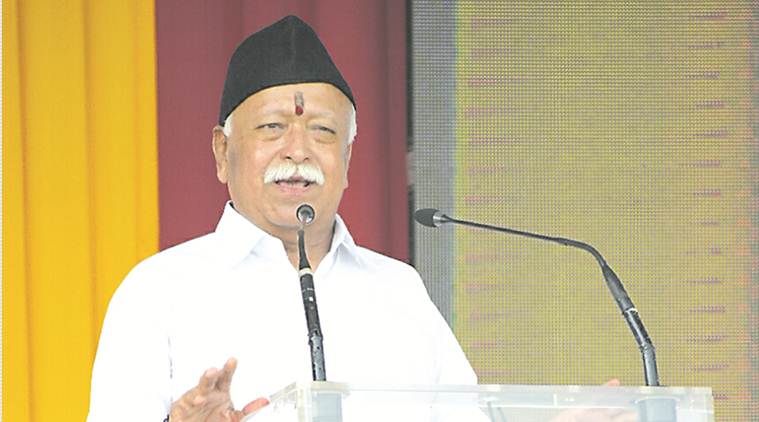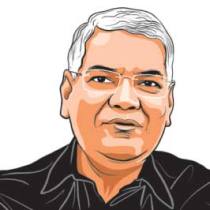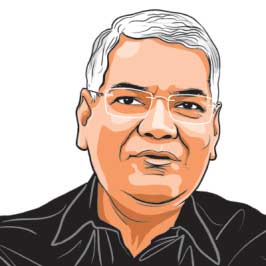Of Lions And Dogs
If the RSS chief had cared to read the speeches of Vivekananda, he would have found that the swami had used the word lion in the context of the awakening of consciousness among all human beings.

While calling for Hindu unity and consolidation, Bhagwat disparagingly said: “If a lion is alone, wild dogs can invade and destroy it.”
The RSS has sought to engage with the civil society and political formations without substantially altering its sectarian, divisive, communal and fascist outlook. Its diabolic adherence to the unconstitutional proposition of Hindu Rashtra was best manifested in the pronouncements of the RSS sarsanghchalak, Mohan Bhagwat, at an event in Chicago organised to commemorate the 125th anniversary of Swami Vivekananda’s historic address. While calling for Hindu unity and consolidation, Bhagwat disparagingly said: “If a lion is alone, wild dogs can invade and destroy it.”How can any outreach be based on such a disdainful attitude and approach to a substantial section of society? It is ironic — and tragic — that in Chicago, where Vivekananda, in his mesmerising lecture delivered on 9/11, 1893, outlined the defining aspects of Hinduism in terms of tolerance, acceptance and interpretation of truth in a variety of ways, the RSS chief negated whatever the swami stood for.
If the RSS chief had cared to read the speeches of Vivekananda, he would have found that the swami had used the word lion in the context of the awakening of consciousness among all human beings. It was to remind people that they are not weak and fragile and they are children of pure nectar born to tune in with infinity, even while leading life in the finite spheres and dimensions. He explained the idealism guiding human destiny based on the ideals enshrined in the Upanishads, which are at the core of Vedanta.
In Chicago, Vivekananda rejected the description of human beings as sinners and invoked the Upanishads to call them children of immortal bliss. He boldly stated that “the Hindu refuses to call you sinners” and added, “Come up, O lions, and shake off the delusion that you are sheep; you are souls immortal, spirits free, blest and eternal; ye are not matter, ye are not bodies; matter is your servant, not you the servant of matter.” Such assertions highlighting the positive aspects of all beings irrespective of their faith became the defining feature of Vivekananda’s expositions on spirituality. He also said that “religion is not the crying necessity of India”.
He turned the searchlight inwards when he wrote to a disciple that, “No religion on earth preaches the dignity of humanity in such a lofty strain as Hinduism and no religion on earth treads upon the necks of the poor and the low in such a fashion as Hindusim”. The RSS and its chief must learn from the life and work of Vivekananda, who described himself as a socialist and interrogated Hinduism with honesty.
Vivekananda proclaimed his self-esteem and pride as a Hindu because as he said, it was Hindus who built mosques for Muslims and churches for Christians. On December 6, 1992, the BJP and RSS mobilised people to demolish the Babri Masjid in the name of Hindusim. This was contrary to the vision of Vivekananda and ethos of the freedom struggle. No wonder that the then chairman of Rajya Sabha, K R Narayanan, said on the floor of the House that the demolition of the Babri Masjid was the worst tragedy India faced after the assassination of Mahatma Gandhi.
The Dravidian movement since its inception has been fighting caste domination. An editorial in the 1920s in Justice, the organ of Justice Party, recalled Vivekananda’s words that the chief goal of spirituality is to put an end to all privileges even as differences remained. Justice also quoted Vivekananda as saying Lord Buddha was the chief destroyer of all caste privileges. That legacy deeply inspired the movement for equality and equal opportunity to all.
Vivekananda went to America to find remedies for the poverty and inequality in India. He, therefore, needs to be understood not only in terms of his exposition of Hinduism and spirituality but also in terms of his explanation of social and economic problems. He famously spoke of Islam as a mighty force for equality and brotherhood and held that as the reason why many “untouchables” embraced Islam. He said India needed the Vedantic brain and Islamic body.
The writer is national secretary, CPI and a Rajya Sabha MP
or all the latest Opinion News, download Indian Express App
More From D. Raja
- The Freedom We Long ForSocial empowerment remains a distant dream for millions..
- House Under SiegeBy undermining Parliament, government is curtailing the role of the Opposition..
- Karl Marx’s echo in AmbedkarAs capitalism and its exploitation evolves, Karl Marx’s philosophy and intellectual tools continue to have abiding significance..








































No hay comentarios:
Publicar un comentario